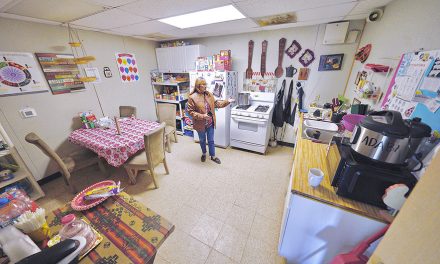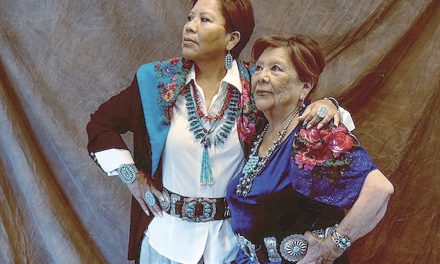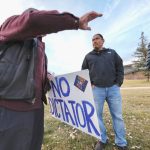
Native News Briefs | More than $2M in COVID-19 relief for pueblos
WASHINGTON
More than $2 million in funding for the Ohkay Owingeh Housing Authority and Pueblo of Zia will help alleviate a housing shortage.
Ohkay Owingeh and Zia will each receive $1 million. These grants will help the Ohkay Owingeh rehabilitate 13 private homes and Zia to construct seven new homes.
Overcrowding and poor housing conditions contributed to the pandemic’s devastating impact on tribal communities and exacerbated housing insecurity.
Ohkay Owingeh Gov. Joseph P. Aguino said, “Ohkay Owingeh being an awardee will benefit many of our tribal members, who have been affected by COVID and are in need of the assistance. I and the tribal council are extremely appreciative of the award and want to say thank you for helping our people.”
Rachel Salas, housing manager for Pueblo of Zia, said, “The Pueblo of Zia tribal members will be so blessed to receive new housing as it will help with overcrowding, families living off the reservation due to no housing available and will provide affordable housing.
“It’s been 25 years since homes were built for the community,” she said. “A great time to receive such a blessing as the Christmas season is here and we’re very thankful.”
Congresswoman Teresa Leger Fernández, D-N.M., said, “The COVID-19 pandemic shed light on the housing shortages that affect our tribal communities every day. Building new homes and rehabilitating housing in place must be a priority and this funding helps meet that need.”
The funding comes from the U.S. Department of Housing and Urban Development’s Indian Community Development Block Grant Program secured through the American Rescue Plan Act.
Indian Affairs announces Living Languages grants
WASHINGTON – The Indian Affairs Office of Indian Economic Development announced Dec. 3 that applications are being accepted for its Living Languages Grant Program.
Funds will enable federally recognized American Indian and Alaska Native tribal entities, as listed in 86 FR 7554, to support Native language programs or build capacity to create or expand language preservation programs.
The office is seeking to fund about 15 to 60 grants ranging in value from approximately $25,000 to $200,000.
Proposals must be submitted to Grants.gov by March 7, 2022.
The announcement comes as Interior Secretary Deb Haaland and first lady Jill Biden were on the Cherokee Nation in Oklahoma to highlight a new initiative to preserve, protect and promote the rights and freedom of Native Americans to use, practice and develop Native languages.
Native language preservation has for many years been cited by Indigenous leaders as important to their self-preservation, self-determination and sovereignty.
Information: Dennis Wilson, Division of Economic Development grants manager, Office of Indian Economic Development-Indian Affairs, U.S. Department of the Interior, 505-917-3235 or Dennis.wilson@bia.gov.
EPA awards $1.5M to Inter Tribal Council of Arizona
SAN FRANCISCO – The U.S. Environmental Protection Agency recently awarded $1.5 million to the Inter Tribal Council of Arizona to help identify sources of lead in drinking water in schools or child care facilities.
The funding will help protect children and help advance the federal action plan to reduce childhood lead exposures.
ITCA’s project will offer testing to schools and child-care facilities on the Navajo Nation and other tribes in California, Arizona, Nevada, and New Mexico.
The money was awarded under the Water Infrastructure Improvements for the Nation Act. The Voluntary Lead Testing in Schools and Child Care Drinking Water grant program continues to help protect children’s health and make progress under the federal action plan to reduce childhood lead exposures.
Children can be more vulnerable to pollutants than adults, which can lead to greater exposure and/or unique windows of susceptibility during development.
This is especially true of lead—an exposure that would have little effect on an adult can have a significant effect on a child. Lead in drinking water is one of the main ways children can be exposed to lead.
Gov apologizes for Nevada’s role in boarding schools
CARSON CITY, Nev. (AP) — When it was time for Winona James to return to school, her family hid her in brush near their home in the Carson Valley to prevent officials from the Stewart Indian School from finding her.
James, a member of the Washoe Tribe of Nevada and California, was among the more than 20,000 students who were sent to the boarding school as part of a federal program designed to forcibly assimilate Native Americans into dominant Euro-American culture.
She attended for one year, but her family feared for her life.
“I can remember that my grandmother didn’t want me to come back to Stewart because she thought I would never, ever go back home again,” she said in interview for a University of Nevada, Reno history initiative in 1984.
The Stewart School in Carson City is among more than 350 residential schools that the U.S. Interior Department plans to examine as part of the Federal Boarding School Initiative Review, which includes an investigation into student deaths and known and possible burial sites.
On Friday, Nevada Gov. Steve Sisolak heard stories from tribal elders about the school’s history.
“It is a tragedy that it has taken so long for the federal government to undertake an honest accounting of an immoral program that existed here for generations,” Sisolak said at the Stewart Indian School, which now houses a cultural center and museum.
The governor apologized on behalf of the state and promised to fully cooperate with the Interior Department and its first Native American secretary, Deb Haaland, as they review records and investigate the federal government’s past policies and oversight of Native American boarding schools.








 Highway 264,
Highway 264, I-40, WB @ Winslow
I-40, WB @ Winslow